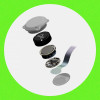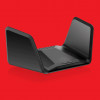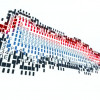'Thin client' computing pushed as Windows alternative
The idea is straightforward: Instead of giving employees computers packed with features they rarely use, companies could save tons of cash by distributing simple machines tied to powerful central servers.
Computing vendors have had marginal success over the years with variations of this "thin client" concept. Now IBM Corp. is betting that with some tweaks, the technology can become a big hit, challenging the traditional approach pushed by Microsoft Corp.
IBM and Sun Microsystems Inc., which also offers a server-based computing system, the Java Desktop, insist their efforts aren't a direct stab at Microsoft's huge -- and hugely profitable -- presence on corporate desktop computers.
Even so, the rivals say they hope to win over corporate technology managers who are tired of the cost and security headaches inherent in having hundreds of PCs running Microsoft's Windows operating system.
In a server-centric computing system, software updates can be pumped to every machine at once, and individual computers can be shielded from viruses and attacks.









































































